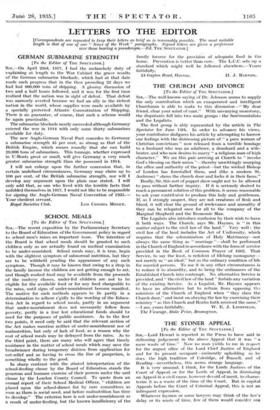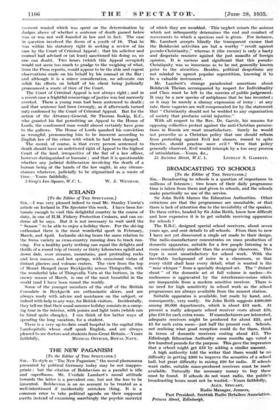THE STONER APPEAL
[To the Editor of THE SPECTATOR.]
SIR,—Lord Hewart is reported in the Press to have said in delivering judgement in the above Appeal that it was " a mere waste of time." Now no man yields to me in respect for the august office of the Lord Chief Justice of England and for its present occupant—eminently upholding as he does the high tradition of Coleridge, of RUssell, and of Reading—nevertheless, this seems strange language.
It is very unusual, I think, for the Lords Justices of the Court of Appeal, or for the Lords of Appeal, in dismissing an Appeal in a civil cause, however devoid of merit, to charac- terize it as a waste of the time of the Court. But in capital Appeals before the Court of Criminal Appeal, this is not an infrequent expression.
Whatever laymen or some lawyers may think of the law's delay or its waste of time, few of them would consider one moment wasted which was spent on the determination' by Judges above of whethei: a sentence of death pinked beldw was or was not well fotinded in law and In fact. The case in question involved the doom of a youth of 18. - That he was within his statutory right in seeking a review of his case by the Court of Criminal Appeal ; that his solicitor and counsel had advised or (at least) sanctioned his doing so, no one can doubt. Two hours (which this Appeal occupied) would not seem too much to grudge to the weighing of what, from the Press reports, would appear to be the able and cogent obseivatiOni-made on his behalf by his counsel at the Bar ; and although it is a minor consideration, no advocate can relish his efforts on behalf of his client being judicially
pronounced a waste of time of the Court. :
The .Court of Criminal' Appeal is not always right ; and in a recent case a frightful miscarriage of justice was but narrowly averted. There a young man had been sentenced to death'; and that sentence had been (wrongly, as it afterwards turned out) confirmed by the Court of Criminal Appeal. But for the action of the Attorney-General, Sir Thomas Inskip, K.C., who granted his fiat permitting an Appeal to the House of Lords, the condemned man would almost certainly have gone to the gallows. The House of Lords quashed his conviction as wrongful, pronouncing him to be innocent according to English law of the crime with which he had been charged.
The moral, of course, is that every person sentenced to death should have an unfettered right of Appeal to the highest Court of the land, irrespective of the fiat of a law officer, however distinguished or humane ; and that it is questionable whether any judicial deliberation involving the death of a human being at the hands of the law ought, in any circum- stances whatever, judicially to be stigmatized as a waste of time.—Yours faithfully,







































 Previous page
Previous page